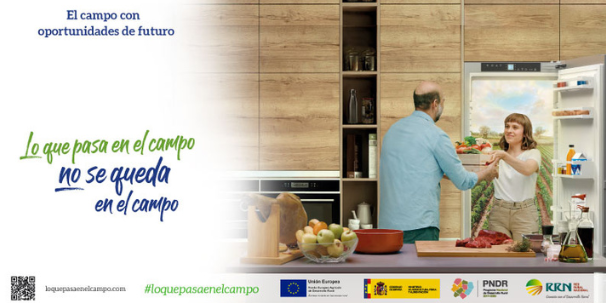
05 de July de 2022
Dinamización rural
The goal is to strengthen ties between rural and urban areas and, more specifically, to make people aware not only of what the CAP does for farmers and ranchers, but also for the benefit of society as a whole.
- The campaign is called "What happens in the countryside doesn't stay in the countryside."
- The objective is to bring greater knowledge of the Common Agricultural Policy (CAP) to the general public.
- 38% of the Spanish population has never heard of the CAP, according to the latest Eurobarometer.
- The CAP has provided a significant boost to the agricultural sector in Spain, as it has contributed to multiplying exports by five and increasing agricultural income by 48%.
The Minister of Agriculture, Fisheries and Food, Luis Planas, presented the communication campaign "What happens in the countryside doesn't stay in the countryside" at the Royal Botanical Gardens in Madrid. The campaign , which aims to raise awareness of the CAP among the general public, aims to do so .
The goal is to strengthen ties between rural and urban areas and, more specifically, to make people aware not only of what the CAP does for farmers and ranchers, but also benefits society as a whole. "The CAP is a policy that supports all citizens because it contributes to providing safe food at reasonable prices," he stated.
Planas also highlighted the benefits of the Common Agricultural Policy (CAP) for society as a whole, as it provides healthy, high-quality food while promoting environmental sustainability and rural development.
PEPAC News
The new CAP, which will come into effect on 1 January 2023, will allocate 43% of its budget to achieving climate and environmental objectives , in line with the European Green Deal and its more agricultural strategies, such as "Farm to Fork" and "Biodiversity by 2030."
Another new initiative is to promote generational renewal and the incorporation of women into rural areas. Specifically, the "What happens in the countryside stays in the countryside" campaign has specific messages for these segments of the population, as they are considered to be key players in the transition to a digitalized agricultural production model.
In this new CAP, in addition to digitalization and the modernization of farms toward increasingly sustainable models to combat climate change, generational change will be key, as Spain will allocate "220 million euros per year exclusively to recruit young people into agricultural activity." It is also important that, for the first time, the future CAP, thanks to Spain, will include measures to promote equality in rural areas . This is one of the specific objectives of agricultural policy.
The CAP for Spain
In Spain, the CAP has provided a significant boost to the agricultural sector, as reflected, for example, in the 48% increase in agricultural income from 1990 to today, and the fivefold increase in exports, which currently exceed €60 billion. Spain has gone from having a negative agri-food trade balance in the 1990s to achieving a positive balance of €19 billion in 2021.
In Spain, the CAP alone accounts for approximately €6.8 billion annually, directly reaching more than 680,000 beneficiaries. The bulk, approximately €5.7 billion, corresponds to direct aid and market-based measures, which primarily "provide a safety net for our producers, protecting them from crises and helping them compete in a globalized world."
Rural development funds total approximately €1.1 billion annually and are complemented by funding from the State and the autonomous communities, with another €550 million.
For the new CAP, Spain, despite the reduction in the community budget due to the United Kingdom's withdrawal from the EU, "has managed to maintain the budget for Spain, with 47.724 billion euros for the period 2021-2027.
PAC's 60th anniversary
The event referred to the 60th anniversary of the CAP and the paradox that it remains largely unknown to many people. According to data from the latest Eurobarometer, 38% of the Spanish population has never heard of the CAP, while another 53% have heard of it but are unaware of its specifics. These figures place us below the EU average and lead this new promotional campaign to be considered "timely, necessary, and pertinent."
The CAP accounts for a third of the entire EU budget, although it generates barely 1% of all public spending in the European Union states. With a daily expenditure per EU citizen of 31 cents, the 447 million inhabitants of the EU "enjoy a stable supply of diverse food at reasonable prices and with the greatest guarantees, in addition to contributing to preserving the environment and rural areas," Planas emphasized.
Campaign data
The campaign will be deployed through digital media, television, radio, print media, and outdoor advertising. It is estimated that 700 million views could be reached. The goal is to increase the Spanish population's awareness of this important European policy, which "is very present in our daily lives," as it takes the form of food and reaches our refrigerators and plates every day.









